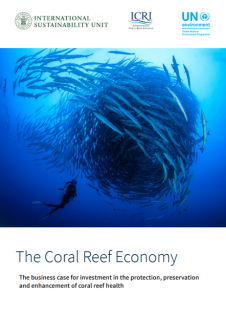
Proactive policies to protect and restore the health of the world’s coral reefs could generate a substantial economic gain, provide important societal benefits, including to local communities, and help deliver the UN Sustainable Development Goals.
This study presents new analysis of the value, costs and benefits of the coral reef economy to highlight that shifting the trajectory of coral reef health from one of continuing decline towards a healthy state could unlock tens of billions of dollars in additional value. The findings show that this shift can be largely achieved through strategic interventions using available tools and methods, indicating that the goal of closing the gap between the forecast benefits of a healthy reef and the current trend towards coral reef degradation is within our reach.
A quantitative model of selected interactions between live coral cover and the economic returns generated by three sectors that benefit directly from coral reefs – tourism, coastal development and commercial fisheries – was applied to two case study regions: the Coral Triangle in South East Asia and the Mesoamerican Reef in the Caribbean. The analysis found that a healthy coral reef scenario is expected to deliver additional economic benefits amounting to $34.6 billion and $36.7 billion in the Mesoamerica Reef and the Coral Triangle, respectively, between 2017 and 2030.
While much of the added financial value would be captured by the private sector, these gains could also create opportunities for governments to develop policies that redistribute part of this wealth to those adversely affected by changes in reef management, such as local fishing businesses. In addition, the societal co-benefits of ecosystem restoration to promote healthy reefs could potentially exceed the private gains, for example through improvements to municipal sanitation, more sustainable local fisheries, reduced soil erosion, and enhanced cultural heritage values.
